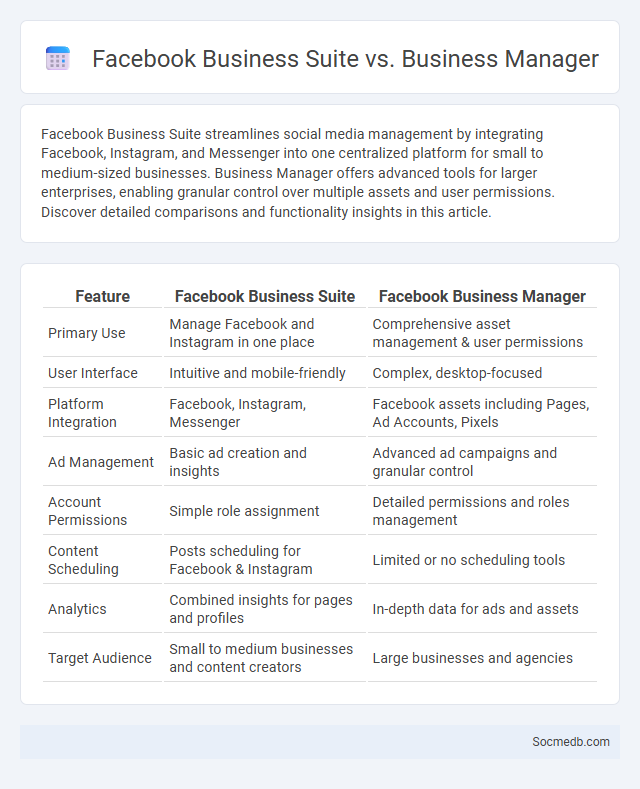
Photo illustration: Facebook Business Suite vs Business Manager
Facebook Business Suite streamlines social media management by integrating Facebook, Instagram, and Messenger into one centralized platform for small to medium-sized businesses. Business Manager offers advanced tools for larger enterprises, enabling granular control over multiple assets and user permissions. Discover detailed comparisons and functionality insights in this article.
Table of Comparison
| Feature | Facebook Business Suite | Facebook Business Manager |
|---|---|---|
| Primary Use | Manage Facebook and Instagram in one place | Comprehensive asset management & user permissions |
| User Interface | Intuitive and mobile-friendly | Complex, desktop-focused |
| Platform Integration | Facebook, Instagram, Messenger | Facebook assets including Pages, Ad Accounts, Pixels |
| Ad Management | Basic ad creation and insights | Advanced ad campaigns and granular control |
| Account Permissions | Simple role assignment | Detailed permissions and roles management |
| Content Scheduling | Posts scheduling for Facebook & Instagram | Limited or no scheduling tools |
| Analytics | Combined insights for pages and profiles | In-depth data for ads and assets |
| Target Audience | Small to medium businesses and content creators | Large businesses and agencies |
Introduction to Facebook Business Management Tools
Facebook Business Management Tools provide a comprehensive platform for businesses to manage their marketing campaigns, pages, and ad accounts efficiently. These tools enable you to organize multiple assets, assign roles, and track performance metrics all in one centralized dashboard. Leveraging Facebook Business Manager allows your company to streamline workflows and optimize social media advertising strategies for better engagement and ROI.
What is Facebook Business Suite?
Facebook Business Suite is a comprehensive tool designed to help businesses manage their Facebook, Instagram, and Messenger accounts in one place. It allows you to schedule posts, respond to messages, and track performance metrics efficiently across platforms. This centralized management solution streamlines your social media marketing efforts, saving time and enhancing engagement with your audience.
What is Facebook Business Manager?
Facebook Business Manager is a powerful tool designed for businesses to manage multiple Facebook pages, ad accounts, and team members in one centralized platform. It enables efficient control of marketing activities, access permissions, and billing information while keeping personal profiles separate from business assets. By streamlining collaboration and ad management, Facebook Business Manager enhances productivity and security for digital marketing campaigns.
Key Features Comparison: Business Suite vs Business Manager
Facebook Business Suite and Business Manager both offer comprehensive tools for managing social media presence, with Business Suite focusing on streamlined content scheduling, messaging, and insights across Facebook and Instagram in a single dashboard. Business Manager provides advanced asset management, granular user permissions, and detailed ad account control, ideal for agencies managing multiple clients or pages. The choice hinges on the scale of operations, with Business Suite suited for small to medium businesses and Business Manager designed for complex organizational needs.
User Interface and Experience
A seamless user interface (UI) in social media platforms enhances user experience (UX) by enabling intuitive navigation and fast-loading content. Responsive design and personalized feeds optimize engagement, reducing bounce rates and increasing session duration. Incorporating accessibility features ensures inclusivity, broadening the platform's reach and user satisfaction.
Supported Platforms and Integrations
Social media platforms support a diverse range of integrations including Facebook, Instagram, Twitter, LinkedIn, and Pinterest, enabling seamless content sharing and management across channels. Integrations with popular tools like Hootsuite, Buffer, and Zapier facilitate automated posting, analytics tracking, and audience engagement. APIs provided by platforms such as Facebook Graph API and Twitter API enhance custom app development and data synchronization for advanced marketing strategies.
Automation and Scheduling Capabilities
Automation and scheduling capabilities on social media platforms streamline your content management by allowing pre-set posting times, ensuring consistent engagement without manual intervention. These tools leverage algorithms to optimize post timing based on audience activity, increasing reach and interaction rates. Integrating automation enhances efficiency and helps maintain a strategic online presence tailored to your target demographics.
Reporting and Analytics Differences
Social media platforms vary significantly in their reporting and analytics tools, affecting how you measure engagement, reach, and conversion metrics. Facebook Insights offers detailed demographic data and post-performance tracking, while Twitter Analytics provides real-time interaction stats and follower growth trends. Understanding these differences ensures your social media strategies are informed by accurate, platform-specific data tailored to your business goals.
Which Tool is Best for Your Business Needs?
Choosing the best social media tool depends on your business goals, target audience, and content strategy. Platforms like Hootsuite offer comprehensive scheduling and analytics, while Buffer excels in ease of use and post management for small teams. Evaluate features such as audience engagement metrics, integration capabilities, and budget to ensure your social media management tool aligns with your business needs.
Final Verdict: Choosing Between Business Suite and Business Manager
Businesses seeking seamless integration across Facebook and Instagram benefit from Business Suite's unified interface and real-time insights. Business Manager remains essential for enterprises requiring advanced access control and comprehensive asset management. Selecting between the two depends on the scale and complexity of your social media operations and team collaboration needs.
 socmedb.com
socmedb.com